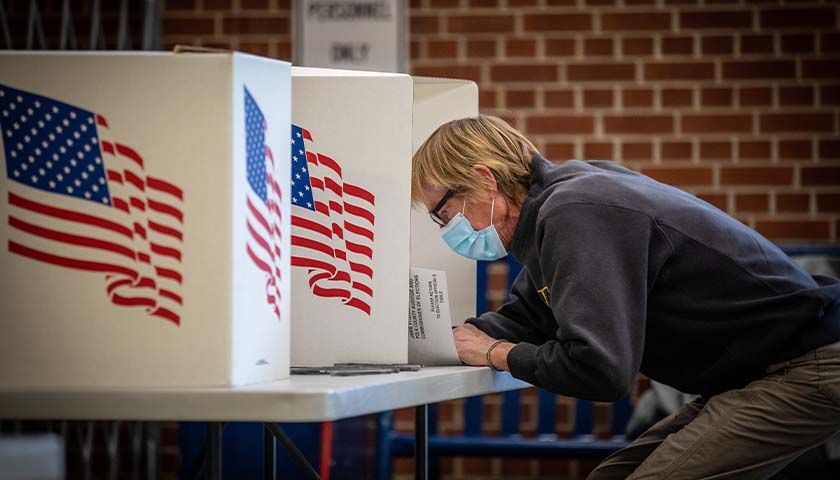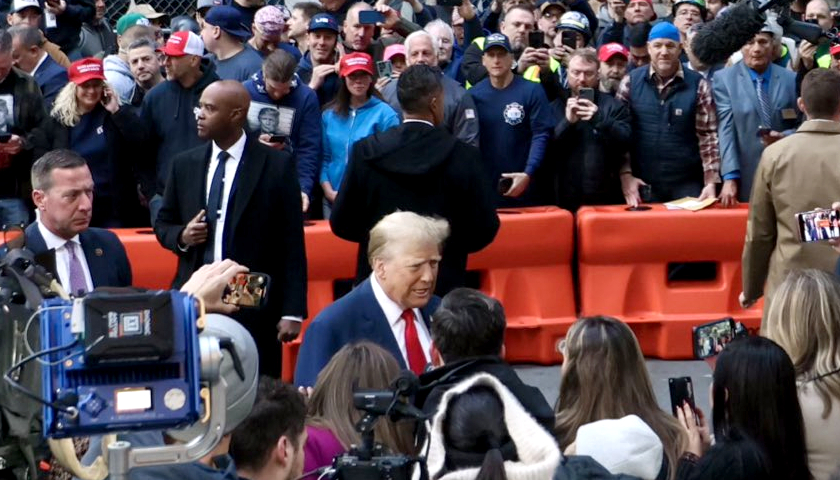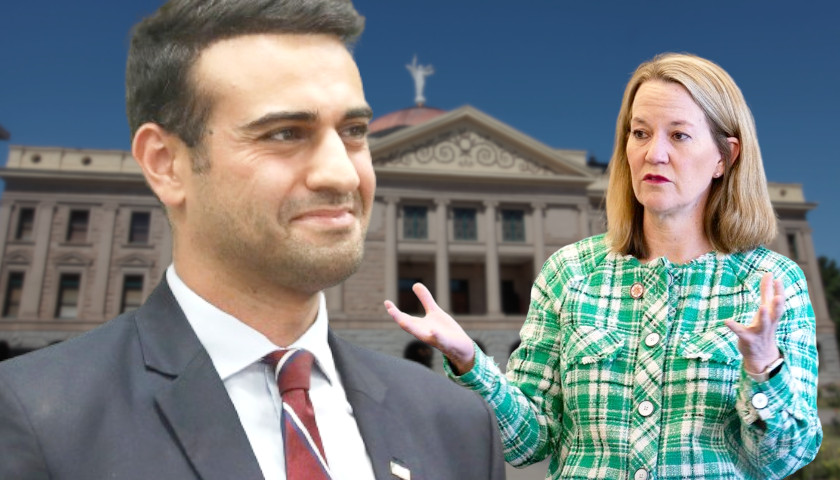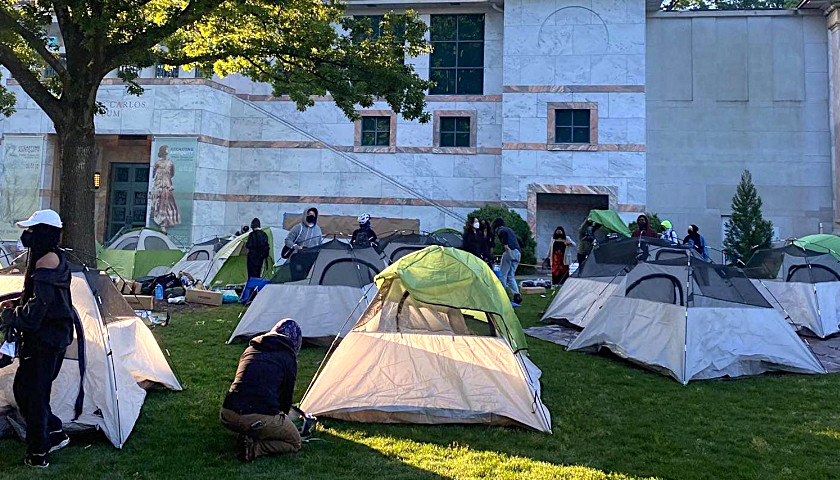by Anthony Gockowski
Minnesotans will head to the polls Tuesday to pick their preferred candidates for the general election. Every seat (201) in the Minnesota Legislature is up for grabs this November because of redistricting.
The Minnesota GOP maintains control of the Minnesota Senate and could take back the House from Democrats.
There are 12 Republican incumbents facing primary challengers and several others who are leaving the House to run for open Senate seats, such as Reps. Cal Bahr, Eric Lucero, Steve Drazkowski, and Jordan Rasmusson.
The incumbents facing challengers are: Reps. Josh Heintzeman, Ron Kresha, Greg Davids, Kurt Daudt, and Erik Mortensen; Sens. Mark Johnson, Paul Utke, Jeff Howe, Gary Dahms, Bill Weber, Gene Dornink, and Eric Pratt.
In some cases, unendorsed incumbents like Pratt and Utke are going to the primary against endorsed challengers.
Tuesday is also both the special election and general primary in Minnesota’s First Congressional District, a seat that has been open since the passing of Republican Rep. Jim Hagedorn. Republican Brad Finstad is the endorsed candidate in the special election but is facing challenger Jeremy Munson, a current state representative, in the general primary.
Both elections are taking place on the same day and under different boundaries. The special election will be held under the old congressional district boundaries, whereas the general primary will be held under the new boundaries.
The winner of the special election will serve the remainder of Hagedorn’s term. It is possible, though unlikely, that Finstad will win the special election but lose the general primary to Munson.
It is, to put it mildly, very confusing.
Republicans will also pick a candidate in the race for attorney general. GOP-endorsed Jim Schultz is running against Doug Wardlow for the nomination. Wardlow ran for attorney general in 2018 and lost to Keith Ellison.
Here’s a quick look at some of the competitive GOP legislative races to watch in Tuesday’s primaries, in no particular order. Follow the links to learn more about each district and candidate.
1. Erik Mortensen vs. Bob Loonan: House District 54A
One of the most closely-watched races is the rematch between Rep. Erik Mortensen and former Rep. Bob Loonan. This is their third primary meeting.
Mortensen unseated Loonan in 2018 when he beat him in the primary but went on to lose the general election. In 2020, the two faced off again, this time with Mortensen winning both the primary and the general.
Both candidates come with some baggage. Mortensen was kicked out of the New House Republican Caucus, itself a group of House GOP defectors, because he was too critical of his fellow Republicans for what he described as a failure to stand up for conservative priorities.
He has been strongly criticized by Rep. Mary Franson, one of the House’s most conservative members.
But he has pulled in an impressive amount of donations for a legislative race. The most recent campaign finance reports show he had $59,000 to spend, compared to Loonan’s $8,500.
Loonan was recently fined $750 for falsely claiming the endorsement of the Minnesota GOP. Neither Mortensen nor Loonan received the party’s endorsement. Loonan, however, was endorsed by Minnesota Citizens Concerned for Life.
2. Natalie Barnes vs. Eric Pratt: Senate District 54
In one of the biggest upsets of the campaign season, outsider Natalie Barnes bested incumbent Sen. Eric Pratt for the GOP’s endorsement earlier this year. Barnes, a nurse, was also endorsed by Dr. Scott Jensen, the presumptive GOP nominee for governor.
Barnes is one of a handful of candidates who alleged the party is working against them despite having the endorsement. At least four endorsed candidates said they were cut off from party data (phone numbers, emails, etc.) last month.
Two of the candidates, Barnes and Bret Bussman, beat out incumbent Republicans for the party’s endorsement — Sen. Paul Utke in Bussman’s case.
Adding to their suspicions could be the fact that a fellow incumbent, Sen. David Osmek, donated $1,000 to Pratt and Utke on April 4, after they lost the endorsements.
The Minnesota GOP has not publicly encouraged any unendorsed legislative candidates like Pratt or Utke to drop out but has done so aggressively in the attorney general’s race and First District contest.
Pratt was first elected to the Senate in 2012 and serves as the chair of the Jobs and Economic Growth Committee. A 30-year veteran of the banking and finance industry, Pratt points to his ability to “work across the aisle and get bills signed into law in a divided government” as reason for his reelection.
3. Bret Bussman vs. Paul Utke: Senate District 5
Like Barnes, Bussman sent shockwaves through GOP circles earlier this year when he earned the endorsement over the two-term Utke.
He and Barnes are among a group of outsider candidates running on issues that emerged during the COVID-19 pandemic, like medical freedom, election integrity, and school choice.
Utke was elected to the Senate in 2016 and serves as the chair of the Health and Human Services Committee. He describes taxes, medical freedom, and public safety as his top issues.
Both Utke and Pratt have significantly more money available than their opponents. Utke has $26,500 available compared to Bussman’s $2,600; Pratt has $55,500 compared to Barnes’ $11,849.
4. Gene Dornink vs. Lisa Hanson: Senate District 23
Infamous restaurant owner Lisa Hanson is challenging incumbent Sen. Gene Dornink, who was first elected in 2020.
The race is filled with political drama. Hanson was jailed for keeping her restaurant open in violation of Gov. Tim Walz’s COVID-19 executive orders. Her bid for Senate is personal. She thinks Dornink didn’t do enough to stand up for her against the governor’s overreach.
Dornink was forced to move because of redistricting. He relocated to Brownsdale, but Hanson’s ex-campaign manager, Keith Haskell, was skeptical, so he surveilled Dornink’s new home.
“At the time, absolutely no traffic, no overnight vehicles, no lights on, shades constantly open, no lights on day or night,” Haskell told MinnPost. “Cars that occasionally parked there that had lots of just general debris indicating they’d sat there for a while. So then we started chalking tires and things like that to see if they moved.”
Haskell’s investigation was then used in a complaint seeking to have Dornink removed from the ballot on the grounds that he failed to abide by residency requirements.
Dornink denied the allegations, calling them “frivolous.” The Minnesota Supreme Court dismissed the complaint on Friday because the petitioner acted with “unreasonable delay” in submitting the claims.
“We applaud the Supreme Court for dismissing this unfounded complaint. Sen. Gene Dornink is a relentless advocate for his constituents and the voters deserve to be able to make their voices heard,” Minnesota GOP Chairman David Hann said in a statement.
Dornink has $37,207 to Hanson’s $4,776. He also has the GOP endorsement.
5. Tom Dippel vs. Tony Jurgens: Senate District 41
Newcomer Tom Dippel is facing off against Rep. Tony Jurgens for this open Senate seat covering the Cottage Grove and Hastings areas in a district that stretches across the south and east metro.
Jurgens, in his third term in the House, lost the GOP endorsement to Dippel but has the backing of the Minnesota Police and Peace Officers Association, as do other non-GOP endorsed candidates like Pratt. Jurgens is also supported by the mayor of Cottage Grove and the local Chamber of Commerce.
Dippel has the support of some of the Legislature’s most conservative members, like Bahr, Drazkowski, and Munson. Jurgens has positioned himself as a moderate who is willing to work across the aisle, whereas Dippel told the Pioneer Press he’s not afraid to “rock the boat.”
Sen. Karin Housley, who represents the Stillwater area, has also weighed in on the race, throwing her support behind Jurgens.
Jurgens has $16,600 available; Dippel has $24,214.
6. Jim Newberger vs. Nathan Wesenberg vs. Steve Wenzel: Senate District 10
This is one of two three-way GOP races for an open seat in the Legislature. Steve Wenzel, a former Democrat who spent 28 years in the Minnesota House, has left retirement to run for the opposing team.
Wenzel made headlines in 2020 when he announced his support for former President Donald Trump, saying the Democratic Party “no longer represents the values and morals” it once did.
“I would say today the Democratic Party is an assortment of radical, left-wing extremist groups that are hellbent on bringing about socialism in this country,” he said at the time. “The leadership today of the Democratic Party is so liberal that I think there are many Democrats in Minnesota who cannot identify with that and they should be encouraged to speak up and leave the party.”
Jim Newberger spent six years in the Minnesota House before running against U.S. Sen. Amy Klobuchar in 2018. He lost by more than 20 points.
Newberger was endorsed by the Child Protection League, which cited his opposition to comprehensive sex-ed in schools and support for full curriculum transparency.
Nathan Wesenberg is a grassroots candidate who vows to pass term limits and put an end to omnibus bills on his website. He also says he will work to pass a “life at conception” bill if elected.
“Having worked for the government, I have seen the corruption and inefficiencies that take place. I cannot stand by and watch my community, state and country be destroyed by high crime, high taxes, overreaching mandates, corruption, and big government,” he said in his campaign announcement.
Wenzel has the most cash available at $16,600, followed by Wesenberg at $10,100, and Newberger at $4,800.
No candidate has received the GOP endorsement in this race.
7. Mark Bishofsky vs. Tina Riehle: House District 33B
Respiratory therapist turned health-freedom activist Mark Bishofsky earned the GOP endorsement over former Stillwater School Board member Tina Riehle.
Bishofsky reportedly got involved in politics after he resigned from his medical job because of his workplace’s mask and vaccine mandates. He was one of the main organizers of a massive medical freedom rally at the Minnesota Capitol last September.
“We the people are the only ones who can stop this. It is about much more than one jab and one job. It is about censorship, freedom of speech, freedom to assemble and freedom to choose what goes in your body,” he told The Minnesota Sun during the rally.
The Minnesota Jobs Coalition, through an affiliated independent expenditure committee, is running direct mail pieces against Bishofsky and Mortensen. The Jobs Coalition is a GOP-aligned group founded by a former House Republican staffer.
The Minnesota Jobs Coalition Legislative Fund is exclusively funded this campaign season by $500,000 from the Republican State Leadership Committee, according to campaign finance records.
This isn’t the first time the Jobs Coalition has targeted endorsed Republicans. During the 2020 election cycle, the group spent more money against Rep. Munson than any individual Democrat.
Some of these shenanigans could be because candidates like Bishofsky, Barnes, Dippel, Bussman, Hanson, and Wesenberg have been celebrated by Action 4 Liberty, a controversial group despised by many Republican leaders.
Bishofsky has touted the endorsement of Rep. Mortensen, one of Action 4 Liberty’s preferred legislators, and participated in fundraising events with him.
Barnes previously told Alpha News she is not working with Action 4 Liberty. She and Dippel are supported by the New House Republican Caucus, which gave Mortensen the boot.
Riehle has the support of some sitting lawmakers, including Housley and retiring Rep. Bob Dettmer. She’s also backed by Minnesota Citizens Concerned for Life, the Minnesota Police and Peace Officers Association, and the Minnesota Chamber of Commerce.
Riehle argues she has the best chance of beating Josiah Hill, a former local teachers union president, in the general election and has criticized Bishofsky for allegedly voting in the 2020 DFL presidential primary.
“I’ve fought to keep schools open. I’ve fought to unmask students, to let them breathe, smile with each other, build friendships and learn with confidence,” she said in her campaign announcement. “I’ve relentlessly voted against the CRT agenda in the classroom and I’ve been public about focusing on reading, writing, and math.”
Bishofsky has significantly more money available than Riehle; $18,500 compared to $1,400.
8. Bill Lieske vs. Jake Cordes: Senate District 58
This race pits former Farmington Area School Board member Jake Cordes against GOP-endorsed candidate Bill Lieske for the open seat in Senate District 58.
As a member of the school board, Cordes praised the work of the district’s “Equity Leadership Team,” according to a recording of a September 2020 meeting.
“This is always an important topic to talk about and discuss but now more than ever with everything going on across our country. It’s important that our staff and our students realize that equity is important,” he said. “I know this is a passion of you guys’ and thank you very much.”
He was also critical of the police officers involved in the death of George Floyd, calling their actions “completely reprehensible” and praising the city’s decision to terminate them, according to a Facebook post.
Cordes is endorsed by the Minnesota Police and Peace Officers Association, the Dakota County Regional Chamber of Commerce, and has described Rep. Pat Garofalo as one of his “political mentors.”
“I want families and businesses to succeed in Minnesota. We will succeed if we prioritize fiscal responsibility in our state budget and work to lower the tax burden on families. I will work with and not against our public safety officers, so we all feel safe in our communities. And I will oppose overarching government mandates, while empowering individuals to make their own decisions in life,” Cordes said in his campaign announcement.
Lieske has earned the praise of Action 4 Liberty for winning the GOP endorsement. He wants to eliminate income taxes, pass constitutional carry, and enact term limits.
“Bill is a family man and small business owner. He is running for the Senate not to build a political career but to fight the political elite that are more concerned with their next election than doing what is right for the people,” he says on his website.
Lieske has about $5,000 in his campaign account, slightly more than Cordes’ $3,500.
9. Pam Altendorf vs. Jesse Johnson: House District 20A
Army veteran Jesse Johnson is running against conservative activist Pam Altendorf for this open seat covering the Red Wing area.
Neither candidate was endorsed by the GOP. Johnson is supported by Minnesota’s largest police association and the Chamber of Commerce/Jobs Coalition wing of the party.
Altendorf is backed by the New House GOP faction. Rep. Drazkowski said he endorsed Altendorf after seeing her fight “for our conservative values at the grassroots level.”
Altendorf and Drazkowski said they plan to co-author a bill to bring universal school choice to Minnesota if elected.
In addition to staple issues like public safety, Johnson says on his website that he will work to pass tax cuts for Minnesotans, return the budget surplus, and support the development of small businesses in rural Minnesota.
Johnson has a slight financial edge over Altendorf, with $11,500 in his account compared to Altendorf’s $10,100.
Other notable races
Rep. Ron Kresha is facing off against Chuck Parins in House District 10A. Neither candidate was endorsed. Blake Paulson, Isaac Schultz, and John Ulrick are competing in another three-way, no-endorsement race for the open House District 10B seat. Larvita McFarquhar, who was fined for keeping her restaurant open during the COVID-19 pandemic, is challenging GOP-endorsed Sen. Gary Dahms in Senate District 15.
– – –
Anthony Gockowski is Editor-in-Chief of Alpha News. He previously worked as an editor for The Minnesota Sun and Campus Reform, and reported for The Daily Caller.
Photo “Election Day 2020” by Phil Roeder. CC BY 2.0.








